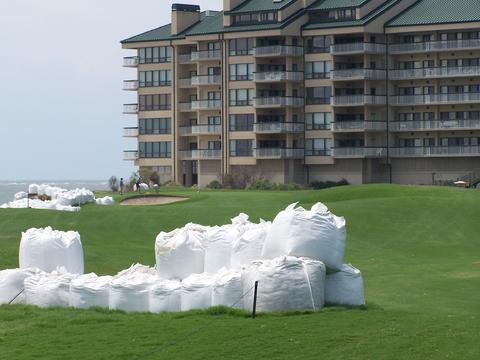We reported here that the 18th green at Wild Dunes' Ocean Course, which we played just this last August, is gone, washed away by the tides, and that the homes adjacent to the 18th fairway and green may be next. This is not an isolated incident. Up and down the east coast of the U.S., from Cape Cod to Florida, some homes are falling into the sea and many others are threatened. Wild Dunes is a microcosm of the issues that face these oceanfront homeowners and their fellow taxpayers, and it should be a cautionary tale for those whose dreams of a future home on the oceanfront could turn into a nightmare.
In a nutshell, the debate on what to do about the situation is the same in Martha's Vineyard as it is at Wild Dunes. People faced with losing their homes believe that the beach is a public resource, and that their governments and fellow taxpayers should help bear the burden to save the pubic resource. Those who don't use the beach or are simply content to let Neptune do his work are not willing to help out. They claim, and with some justification, that those who built homes where protective dunes once stood knew they were courting disaster eventually. It is now eventually.

The lines were drawn pretty sharply in a group of letters to the editor a week ago in the Charleston (SC) Post & Courier, the major local paper which had come out earlier in October for removal of the sand bags holding back the sea. Earlier attempts had resulted in shredding of the bags, which were then carried out to sea and, in the Post & Courier's opinion, created "a hazard for marine life as well as an oceangoing litter problem for the state's entire coast." The Wild Dunes owners believe the sand bags are the only way to hold back the sea in combination with sand they want trucked in from farther north, as well as sand from a spit just south of Wild Dunes (bringing in local sand isn't going to happen, according to local officials). The situation is a mess, both literally and figuratively, and it is fraying nerves; and although those of us at a distance may feel sorry for those facing the loss of their homes, some of their fellow citizens are talking like it is Judgment Day.
"...everyone has been forewarned about building too close to the shore," wrote one local citizen who argued for letting the homes fall into the sea. "Wild Dunes residents have chosen to ignore these warnings for decades,"
"We need to stop writing new flood insurance policies on undeveloped land," wrote another. "If an owner wants to develop, then let him self-insure...Once a structure is destroyed, the flood insurance should pay and the land abandoned, never to be developed again."
A Wild Dunes owner, fearful of what will happen to the resort's private oceanfront club and the entire island's economy, wrote, "Unfortunately and inexplicably, it seems that some local critics would be happy to have our buildings and golf course fall into the ocean. For those of us who live and golf along the ocean, and for our supporters in the Charleston area, that attitude is a shortsighted view relative to the long-term viability of the Isle of Palms."
We won't predict the outcome on Isle of Palms, but those Blue Ridge Mountains in the Carolinas are looking more attractive than ever.



